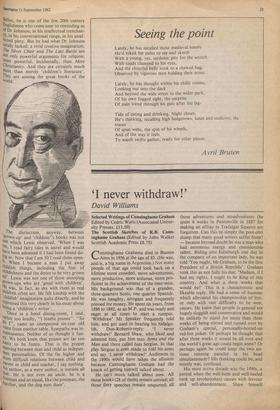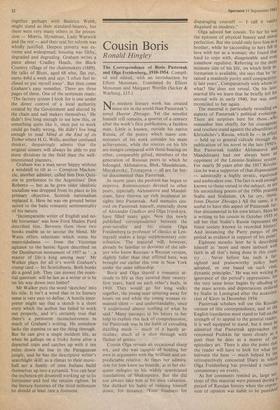`I never withdraw!'
David Williams
Cunninghame Grahame died in Buenos Aires in 1936 at the age of 83. (He was, and is, a big name in Argentina.) Not many people of that age could look back on a lifetime more crowded, more adventurous, more productive, more arduous, more pro- ficient in the achievement of the near-miss. His background was that of a grandee, three-quarters Scots, one quarter Spanish. He was haughty, arrogant and frequently pressed for money. He spent six years, from 1886 to 1892, as an M.P. and was ready and eager at all times to start a rumpus. `Withdraw' Mr Speaker frequently told him, and got used to hearing his hidalgo- ish, Don-Roberto-reply: '1 never withdraw!' Bernard Shaw, who liked and admired him, put him into Arms and the Man and there called him Sergius. In that play Sergius is even made to fold his arms and say 'I never withdraw!' Audiences in the 1890s would have taken the allusion because Cunninghame Graham had the knack of getting himself talked about.
He isn't much talked about now. All those books (28 of them) remain unread; all those fiery speeches remain unquoted; all those adventures and misadventures (he spent 6 weeks in Pentonville in 1887 for making an affray in Trafalgar Square) are forgotten. Can this be simply the post-obit slump that many good writers suffer from? — because beyond doubt he was a man who had enormous energy and considerable talent. Riding into Edinburgh one day in the company of an important lady, he was told 'You ought, Mr Graham, to be the first President of a British Republic'. Graham took this as not fully his due. 'Madam, if I had my rights, 1 ought to be King of this country. And what a three weeks that would be!' This is a characteristic and likeable reply. He had a sense of humour which alleviated his championship of lost, or only with vast difficulty to be won, causes. He knew that people in general are hugely sluggish and conservative and would be unlikely to stand for more than three weeks of being stirred and turned over by Graham's special, personally-hotted-up red-hot poker. Or perhaps he thought that after three weeks it would be all over and the world's great age could begin anew? Or perhaps again he could keep the two no- tions running parallel in his head simultaneously? His thinking could be, and mostly was, confused.
His most active decade was the 1890s, a period when the well-born and well-heeled took up revolutionary causes with fervour and self-abandonment. Shaw himself
together perhaps with Beatrice Webb, might stand as their standard-bearers, but there were very many others in the proces- sion — Morris, Hyndman, Lady Warwick and the rest — and their zeal for reform was wholly justified. Deepest poverty was ex- treme and widespread; housing was filthY,. degraded and degrading. Graham writes a piece about Cradley Heath, the Black Country village of the chainmakers (1889). He talks of Blunt, aged 68 who, flat out, earns 4s9d a week and says 'I often feel in- clined to put myself away'. But then come Graham's easy remedies. There are three pages of these. One of the sentences reads: `The factory system I look for is one under the direct control of a local authority created by the Government and elected by the chain and nail makers themselves.' He didn't live long enough to see how this, or something quite like it, once put to work could go badly wrong. He didn't live long enough to read Mind at the End of its Tether where H.G. Wells; another confused thinker, despairingly admits that the original sinners will always be able to put more divisions in the field than the well- intentioned planners.
Graham was a man never happy without a windmill to tilt at — Compton Macken- zie, another admirer, called him Don Quix- ote in preference to the Argentines' Don Roberto — but as he grew older idealistic socialism was dropped from its place as his primary objective. Scottish nationalism replaced it. Here he was on ground better suited to the basic romantic sentimentality of his nature.
`Incomparable writer of English and no- ble horseman' was how Ford Madox Ford described him. Between them these two books enable us to savour the blend. Mr Watts offers selections which stress his manysidedness — from the Victorian agitator to the heroic figure described on the Dumbarton monument of 1937 as `...a master of life/a king among men'. Mr Walker plays for all it's worth Graham's trump card — his Scottishness. Both books do a good job. They can answer the essen- tial question: will he last as a writer or is he on his way down into limbo?
Mr Walker puts the word 'sketches' into his title. It isn't a word that in its literary sense is very easy to define. A hostile inter- preter might say that a sketch is a short story which the author has failed to work out properly, and it's certainly true that there's a persistent inconclusiveness in much of Graham's writing. He somehow lacks the stamina to see the thing through. But he can give a single incident life, as when he gallops on a frisky horse after a departed train and catches up with it ten miles down the line in the Paraguayan jungle, and he has the descriptive writer's searchlight skill: as a climax to their music- hall act a family of nine Italians build themselves up into a pyramid. You can hear the orchestra-pit drumroll working up to its fortissimo and feel the tension tighten. In the literary histories of the third millenium he should at least rate a footnote.



































 Previous page
Previous page